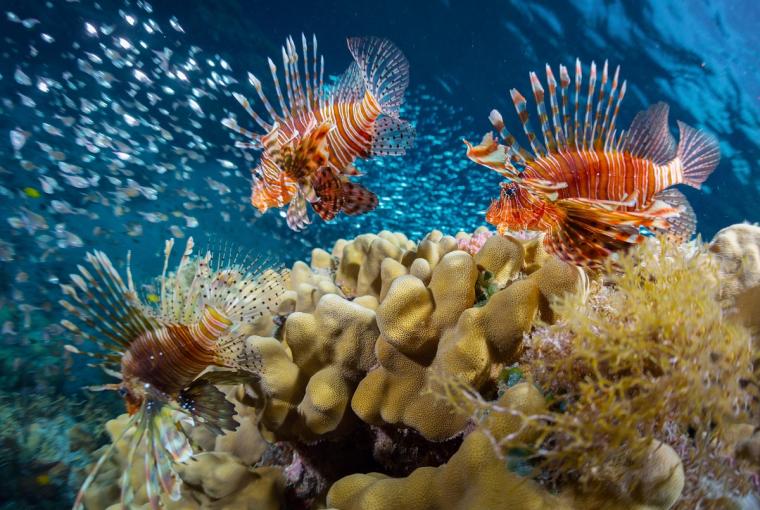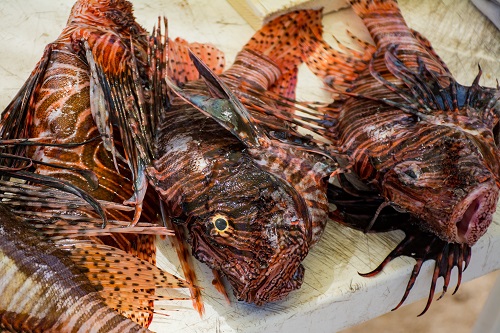
Fishing tournaments targeting carp and other invasive species such as northern snakeheads have become increasingly popular in recent years. But lionfish is wreaking particular havoc in Florida.
The hovering, venomous fish has long been a mainstay in aquariums. But in the wild waters — including the Western Atlantic Ocean — it has become a “poster child” for invasive species, according to the National Oceanic and Atmospheric Administration. “Their populations continue to expand, threatening the well-being of coral reefs and other marine ecosystems,” NOAA Fisheries notes. “This includes the commercially and recreationally important fish that depend on them.” The association estimates a single lionfish can eat 5,000 native animals per year.
Don’t recognize the lionfish? This clip from the 1988 comedy classic, “The Naked Gun,” might bring it back.
“While they do look pretty and they’re cute in a fish tank, they’re deteriorating our reef systems by eating absolutely everything that comes near them that can fit into their mouth,” Cindy Garb, president and chief executive officer of the Instigator Fishing and Diving charter company based in Swansboro, N.C., told North Carolina Public Radio. “They are the freakin’ trash truck of the sea.”
The Florida Fish and Wildlife Conservation Commission (FWC) recently wrapped up the 2022 Lionfish Challenge, a statewide fishing competition with a tiered prize system to encourage continued harvest that ran from Memorial Day to Labor Day in an effort to curb the spread of the invasive species.
“Some of the things that our fishermen are trying to catch are directly impacted by lionfish,” Eric Johnson, a professor at the University of North Florida, told the CBS-TV affiliate. “They also eat a lot of the smaller fish on the reef, which perform really important ecological services.”

The Lionfish Challenge resulted in divers harvesting nearly 22,300 lionfish. Prizes included a tournament shirt and commemorative 2022 Lionfish Challenge coin (Tier 1); cutting shears, reusable heat packs, sting cream and a dive flag (Tier 2); a 19-inch lionfish containment unit, a pole spear and puncture-resistant gloves (Tier 3); a Yeti cooler (Tier 4); and a variety of raffle prizes. Some dive groups collected more than 1,000 lionfish, according to news reports.
In May, almost 14,000 lionfish were removed from the Gulf of Mexico during the 4th Annual Emerald Coast Open Lionfish Tournament in Destin, Fla. — billed as “the largest lionfish tournament in the world.” Almost 150 individual hunters competed for nearly $100,000 in cash and prizes. To celebrate the event, local eating establishments during Emerald Coast Open Lionfish Restaurant Week served unique lionfish dishes — including Restaurant Week Champion Brotulas, which offered pan-seared lionfish with forbidden rice and zucchini ribbons.
Back in April, a team of spearfishermen set a new record for hauling in lionfish. FieldandStream.com reports that Team Forever Young from Islamorada, Fla., speared 426 lionfish in a single day. The accomplishment was part of the Reef Environmental Education Foundation‘s 2022 Earth Day Lionfish Derby in Monroe County, Fla.
“Everything came together really well for this tournament,” Captain Tony Young, owner of Forever Young Spearfishing, said. ”We basically had one full day from sunup to sundown to fish. We actually removed a large number of fish off of our regular reef sites in the evening. They were all breeding pairs of lionfish, so it was cool to remove those ones.”
“Lionfish divers are a close-knit community, staying in one another’s houses, trading diving stories, and amiably competing for who can kill the most fish,” according to The New Yorker, which reported on the Emerald Coast Open. “Their goal is a balanced, usable ecosystem: killing a lionfish saves a yellowtail snapper that, in turn, can be caught for dinner. Hunting lionfish is satisfying but labor-intensive. They won’t chase a hook, and a dragnet is impractical, because it would snag on the reefs where they live. Lionfish must be killed one by one, with a pole spear: a metal rod, with jagged prongs at the end, that you launch through the water by deploying a rubber sling. There are many variations on these poles—three-foot, seven-foot, three-pronged, five-pronged—and they have such names as the Lionfish Buster and the Lionator.”
Efforts such as the Emerald Coast Open, the FWC’s Lionfish Challenge and REEF’s Lionfish Derbies are paying off, according to Amy Lee, REEF’s engagement and communications manager. “REEF Lionfish Derbies educate the public about the impacts of invasive species, serve as an opportunity for scientists to gather lionfish data, and promote a consumer market for lionfish” she told FieldandStream.com. “Studies have shown that regular lionfish removals through events like derbies can significantly reduce lionfish populations at the local scale and encourage communities to stay involved in efforts to control and manage lionfish.”

